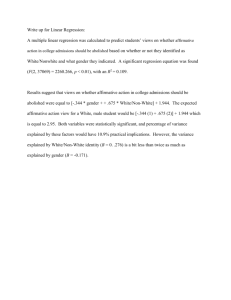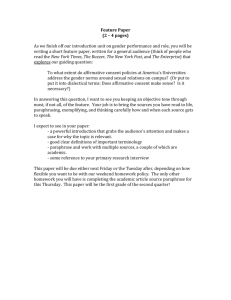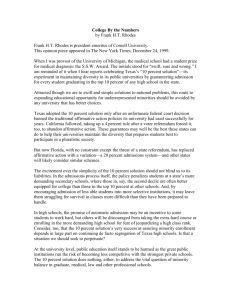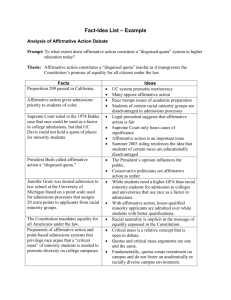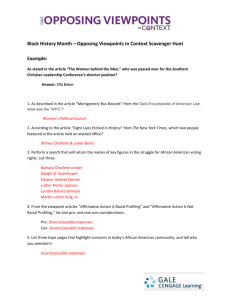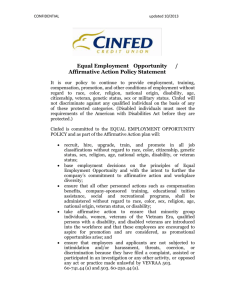Old wounds open up again as America faces more agonising over
advertisement
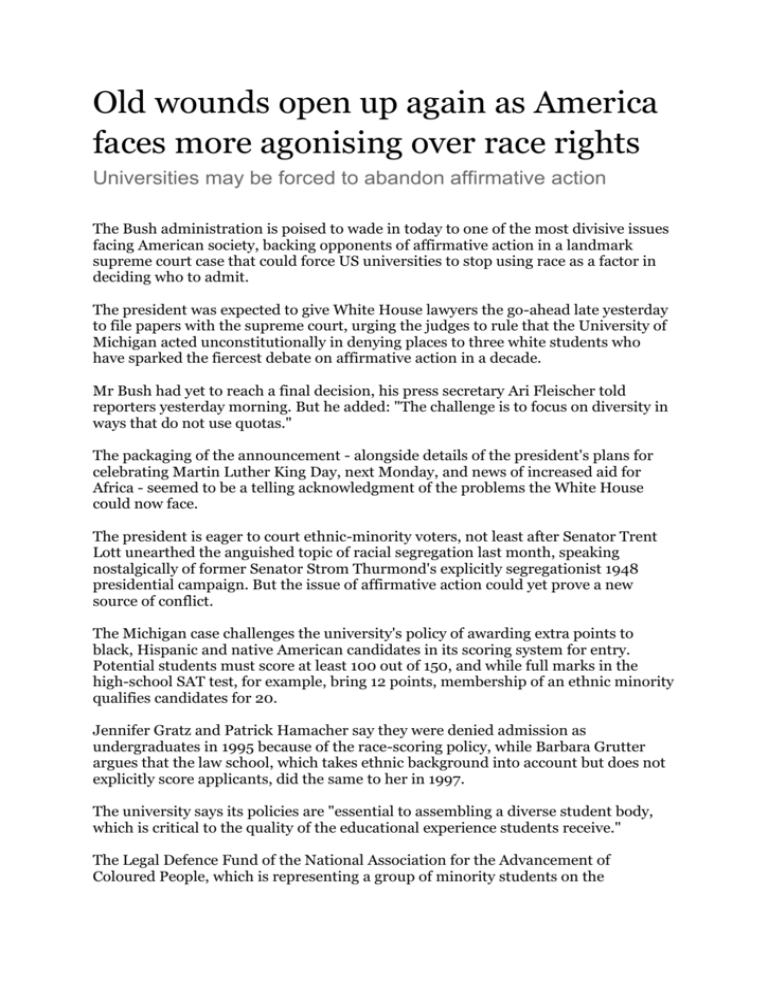
Old wounds open up again as America faces more agonising over race rights Universities may be forced to abandon affirmative action The Bush administration is poised to wade in today to one of the most divisive issues facing American society, backing opponents of affirmative action in a landmark supreme court case that could force US universities to stop using race as a factor in deciding who to admit. The president was expected to give White House lawyers the go-ahead late yesterday to file papers with the supreme court, urging the judges to rule that the University of Michigan acted unconstitutionally in denying places to three white students who have sparked the fiercest debate on affirmative action in a decade. Mr Bush had yet to reach a final decision, his press secretary Ari Fleischer told reporters yesterday morning. But he added: "The challenge is to focus on diversity in ways that do not use quotas." The packaging of the announcement - alongside details of the president's plans for celebrating Martin Luther King Day, next Monday, and news of increased aid for Africa - seemed to be a telling acknowledgment of the problems the White House could now face. The president is eager to court ethnic-minority voters, not least after Senator Trent Lott unearthed the anguished topic of racial segregation last month, speaking nostalgically of former Senator Strom Thurmond's explicitly segregationist 1948 presidential campaign. But the issue of affirmative action could yet prove a new source of conflict. The Michigan case challenges the university's policy of awarding extra points to black, Hispanic and native American candidates in its scoring system for entry. Potential students must score at least 100 out of 150, and while full marks in the high-school SAT test, for example, bring 12 points, membership of an ethnic minority qualifies candidates for 20. Jennifer Gratz and Patrick Hamacher say they were denied admission as undergraduates in 1995 because of the race-scoring policy, while Barbara Grutter argues that the law school, which takes ethnic background into account but does not explicitly score applicants, did the same to her in 1997. The university says its policies are "essential to assembling a diverse student body, which is critical to the quality of the educational experience students receive." The Legal Defence Fund of the National Association for the Advancement of Coloured People, which is representing a group of minority students on the university's behalf, further argues that "race-conscious admissions policies are justified to remedy both past and present discrimination at the university". Fixed quotas themselves have been outlawed since 1978, following the case of Bakke v the University of California Regents. Allan Bakke, a white student and aspiring doctor, claimed he had been passed over for entry to medical school despite significantly higher grades than successful black applicants. The supreme court ruled against quotas, saying Mr Bakke had been denied the constitutional guarantee of equal protection under the law - but arguably delivered a bigger victory to supporters of affirmative action, ruling that the broader goal of classroom diversity was "a compelling state interest". Third way Wary yesterday of the political hazards, the president's chief strategist, Karl Rove, was understood to be urging a more politically palatable stance against the position of Ted Olson, the solicitor-general, a staunch opponent of giving race any consideration whatsoever in the admissions process. Republican opponents of affirmative action have long sought to forge a third stance, called "affirmative access", promoting policies they claim lead to diversity without specifically targeting race. As governor of Texas, Mr Bush supported a court case that forced the state's public universities to abandon ethnicity-based admissions, but argued that his alternative strategy - making the top 10% of all high-school students eligible for admission actually served black and Hispanic students better, since many public high schools are predominantly non-white. "If you look back at the history, result was a slight increase in diversity," said Taylor Griffin, a White House spokesman. "The president has a record of believing that the strength of our nation derives in large part from diversity." But David Gersten, executive director of the Centre for Equal Opportunity, which opposes affirmative action, said any equivocal position taken by the administration would please nobody. "The infamous Bakke case left everyone clueless as to which direction to go in, and if the White House is suggesting there's a way to split hairs in this matter, they will do no-one a service. They shouldn't file a brief at all if they can't decide once and for all that racial preferences have no place in admissions." Diversity, Mr Gersten said, "is a worthy goal, but not one that can be proven to supersede equal rights and individual opportunity", while affirmative action, he argued, often ended up harming those it was intended to serve. Even President Bill Clinton, essentially an energetic supporter of affirmative action, was forced to review the policy in 1997 after a school board in New Jersey, facing budget cutbacks, fired a white teacher, Sharon Taxman, rather than her black colleague, and made the racial basis for the decision explicit. "A simple desire to promote diversity for its own sake... is not a permissible basis for taking race into account," the government declared in legal documents at the time. Bill Lann Lee, President Clinton's assistant attorney general for civil rights and now a San Francisco lawyer, told the Guardian there was a general acceptance of the procedures Mr Bush will reportedly oppose. "A very significant brief was filed by General Motors in the Michigan cases. It lays out the case why GM, which employs many graduates of the University of Michigan, would like to see the diversity-admissions programme continue: because GM and other companies have become global enterprises," he said. "Diversity equips American students to deal with people from different backgrounds, cultures and races - to be better businesspeople." And proponents point out that another crucial factor in university admissions - the extra points awarded to those whose parents attended the institution overwhelmingly favours white applicants. Senator John Edwards, a Democratic contender for the 2004 presidential nomination, recently called for "legacy preferences" to be abolished entirely. Such a move may be unlikely: the preferences help curry favour with wealthy alumni, who currently provide 28% of all private donations to higher education in the US. The debate grew still more charged earlier this month when a report from the American Association of University Professors concluded that affirmative action had failed to improve the educational prospects of ethnic minority students. "Thirty years of affirmative action, largely as preferential admissions, has failed, and it has failed at individual institutions," wrote Edward Renner, a former professor of psychology at the University of Pennsylvania, who conducted the study.
